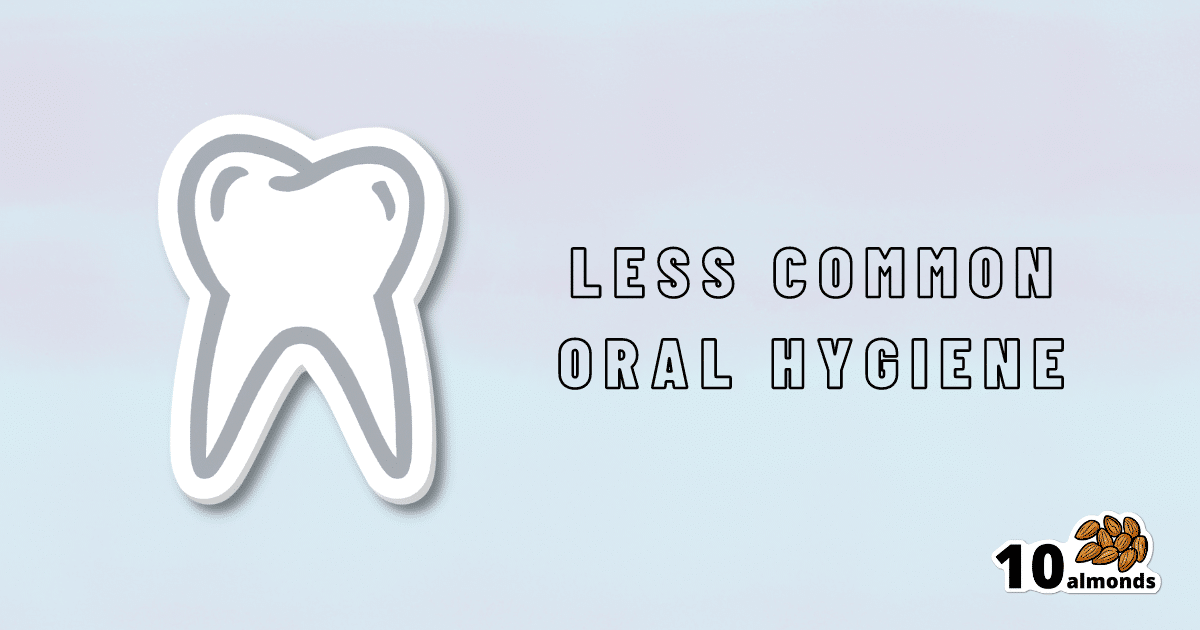Less Common Oral Hygiene Options
Less Common Oral Hygiene Options: Tooth Soap, Oil Pulling, and Chewing Stick. Simplify brushing with soap, try oil pulling for mixed results, or use a Salvadora persica twig for effective cleaning.

Less Common Alternatives For Oral Hygiene!
You almost certainly brush your teeth. You might use mouthwash. A lot of people floss for three weeks at a time, often in January.
There are a lot of options for oral hygiene; variations of the above, and many alternatives too. This is a big topic, so rather than try to squeeze it all in one, this will be a several-part series.
- The first part was: Toothpastes & Mouthwashes: Which Help And Which Harm?
- The second part was: Flossing, Better (And Easier!)
- The third (and for now at least, final) part will look at some less common alternatives.
Tooth soap
The idea here is simplicity, and brushing with as few ingredients as possible. Soap cleans your teeth the same way it cleans your (sometimes compositionally quite similar) dishes, without damaging them.
We’d love to link to some science here, but alas, it appears to have not yet been done—at least, we couldn’t find any!
You can make your own tooth soap if you are feeling confident, or you might prefer to buy one ready-made (here’s an example product on Amazon, with various flavor options)
Oil pulling
We are getting gradually more scientific now; there is science for this one… But the (scientific) reviews are mixed:
Wooley et al., 2020, conducted a review of extant studies, and concluded:
❝The limited evidence suggests that oil pulling with coconut oil may have a beneficial effect on improving oral health and dental hygiene❞
The “Science-Based Medicine” project was less positive in its assessment, and declared that all and any studies that found oil pulling to be effective were a matter of researcher/publication bias. We would note that SBM is a private project and is not without its own biases, but for balance, here is what they had to offer:
A more rounded view seems to be that it is a good method for cleaning your teeth if you don’t have better options available (whereby, “better options” is “almost any other method”).
One final consideration, which the above seemed not to consider, is:
If you have sensitive teeth/gums, oil-pulling is the gentlest way of cleaning them, and getting them back into sufficient order that you can comfortably use other methods.
Want to try it? You can use any food-grade oil (coconut oil or olive oil are common choices).
Chewing stick
Not just any stick—a twig of the Salvadora persica tree. This time, there’s lots of science for it, and it’s uncontroversially effective:
❝A number of scientific studies have demonstrated that the miswak (Salvadora persica) possesses antibacterial, anti-fungal, anti-viral, anti-cariogenic, and anti-plaque properties.
Several studies have also claimed that miswak has anti-oxidant, analgesic, and anti-inflammatory effects. The use of a miswak has an immediate effect on the composition of saliva.
Several clinical studies have confirmed that the mechanical and chemical cleansing efficacy of miswak chewing sticks are equal and at times greater than that of the toothbrush❞
Read in full: A review of the therapeutic effects of using miswak (Salvadora Persica) on oral health
And about the efficacy vs using a toothbrush, here’s an example:
Comparative effect of chewing sticks and toothbrushing on plaque removal and gingival health
Want to try the miswak stick? Here’s an example product on Amazon.
Enjoy!
Share This Post
Learn To Grow
Sign up for weekly gardening tips, product reviews and discounts.




